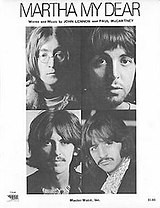Martha My Dear
| "Martha My Dear" | |
|---|---|
 Cover of the Maclen Music sheet music | |
| Song by the Beatles | |
| from the album The Beatles | |
| Released | 22 November 1968 |
| Recorded | 4–5 October 1968 |
| Studio | Trident, London |
| Genre | |
| Length | 2:28 |
| Label | Apple |
| Songwriter(s) | Lennon–McCartney |
| Producer(s) | George Martin |
"Martha My Dear" is a song by the English rock band the Beatles from their 1968 double album The Beatles (also known as the "White Album"). Credited to Lennon–McCartney, the song was written solely by Paul McCartney, and was named after his Old English Sheepdog, Martha. The song has been interpreted as a veiled reference to his break up with Jane Asher, particularly in the line "don't forget me". It is believed that the line "Help yourself to a bit of what is all around you" refers to her alleged affair while away from McCartney with The Old Vic Theatre.[3][4] It has been covered by several artists, including Slade, Herb Alpert & The Tijuana Brass, Phish, World Party, and Les Boréades de Montréal.[5]
Style and form
[edit]The song incorporates elements from pop rock music;[2] it also features a music hall-inspired piano line that recurs throughout the piece, as well as a brass section. The song modulates through several keys.[1]
The song is notated mainly in the key of E♭ major,[6] showing up embellished chords with jazzy sprinkled dissonances. The verse is a syncopated replicate of the first melodic section adding two extra beats, a technique similar to that used later by McCartney in "Two of Us". Though the bridge is in the key of F major, the manner in which it abruptly sets in and exits makes it sound more out-of-the-way than it really is.[1]
Recording
[edit]According to Beatles biographers Ian MacDonald and Mark Lewisohn, "Martha My Dear" is one of the few songs by the band in which McCartney played all the instruments (except orchestral instruments played by session musicians). Such a scenario was increasingly common for him during the height of the tensions that marred the sessions for the album. Although George Harrison is known to have recorded a portion of the electric guitar on the final recording, he was not credited by MacDonald and Lewisohn. Additionally, in the liner notes for the 2018 deluxe edition of the White Album, author Kevin Howlett credits Ringo Starr as having played drums.[7]
The song was recorded over two days on 4 and 5 October 1968 at Trident Studios in London.[8] McCartney recorded the piano, drums and vocals on the first day. He was advised to have producer George Martin play the piano solo because it was believed that the solo was beyond McCartney's competency, but McCartney persisted. Martin's brass and string arrangements were overdubbed later that day. On 5 October, McCartney re-recorded his vocals, added handclaps, and overdubbed bass and guitar parts, completing the song that day.[8]
Legacy
[edit]Coinciding with the 50th anniversary of its release, Jacob Stolworthy of The Independent listed "Martha My Dear" at number 20 in his ranking of the White Album's 30 tracks. He called the song "one of the album's most unfairly maligned tracks" and "irresistibly charming".[9]
Personnel
[edit]The Beatles
- Paul McCartney – double-tracked lead vocals, piano, bass, handclaps
- George Harrison – electric guitar
- Ringo Starr – drums[7]
Additional musicians
- Bernard Mille, Dennis McConnell, Lou Sofier, Les Maddox – violins
- Leo Birnbaum, Henry Myerscough – violas
- Reginald Kilby, Frederick Alexander, Peter Halling – cellos
- Leon Calvert – trumpet, flugelhorn
- Stan Reynolds, Ronnie Hughes – trumpets
- Tony Tunstall – French horn
- Ted Barker – trombone
- Alf Reece – tuba
String and brass arrangement by George Martin.
Notes
[edit]- ^ a b c Pollack 1995.
- ^ a b Chew, DeReiter & Doheny 2010, p. 327.
- ^ MacDonald 2005, p. 322.
- ^ Raul (10 January 2010). "The Story About Paul McCartney's Dog Martha". John Lennon, Paul McCartney, The Beatles. Archived from the original on 1 October 2012. Retrieved 8 October 2012.
- ^ Lewis, Michael; Spignesi, Stephen J. (2009). 100 Best Beatles Songs: A Passionate Fan's Guide. Philadelphia, Pennsylvania: Running Press. pp. 130–132. ISBN 978-1603762656.
- ^ "Digital Sheet Music – The Beatles – Martha My Dear". Musicnotes.com. New York City: Sony/ATV Music Publishing. 10 July 2006. Retrieved 7 September 2020.
- ^ a b "Martha My Dear". The Beatles Bible. 16 March 2008.
- ^ a b Lewisohn 1988, p. 159.
- ^ Stolworthy, Jacob (22 November 2018). "The Beatles' White Album tracks, ranked – from Blackbird to While My Guitar Gently Weeps". The Independent. Retrieved 27 March 2019.
References
[edit]- Chew, Leslie; DeReiter, Dwight; Doheny, Cathy (2010). The Daily Book of Classical Music: 365 Readings That Teach, Inspire & Entertain. Walter Foster Publishing. ISBN 978-1600582011.
- Lewisohn, Mark (1988). The Beatles Recording Sessions. New York: Harmony Books. ISBN 0-517-57066-1.
- MacDonald, Ian (2005). Revolution in the Head: The Beatles' Records and the Sixties (Second Revised ed.). London: Pimlico (Rand). ISBN 1-84413-828-3.
- Pollack, Alan W. (1995). "Notes on Martha My Dear". Notes on ... Series (No. 137). Retrieved 10 July 2008.
